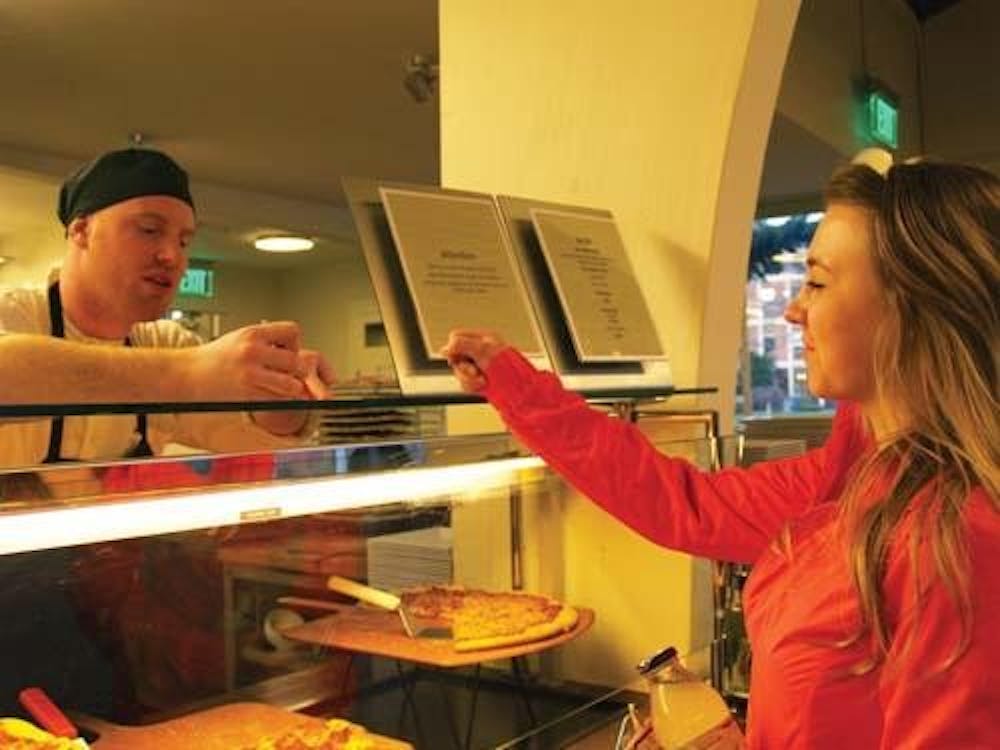Proof of payment system to take effect in stages in The Commons and The Cove
Simon Harris marks the receipt that Anne Marip Morgenstern hands him in exchange for her pizza. Due to increases in theft, Bon Appétit has introduced a new proof of payment system, where students have to show they paid before receiving food (Monica McAllister | The Beacon)
By Will Lyons, Staff Writer -- lyons14@up.edu
In response to increasing theft among the student body, Bon Appétit will introduce a proof of purchase system for all food stations in The Commons and The Cove by spring break.
Students will have to pre-pay for prepared food from all of Bon Appétit's Commons stations, including pizza and pasta, taqueria, carve, sandwiches and paninis and The Cove's wraps, salads and sandwiches. Once students have obtained a receipt for their chosen entrée and sides, they will present the proof of payment to servers and receive their food.
According to Bon Appétit Manager Kirk Mustain, The Commons loses 10 to 15 percent of all sales revenue to theft.
"Everyone who steals thinks they're the only one doing it," Mustain said. "All of my staff and I take the theft very personally."
Mustain has tried a variety of tactics to cut down on stealing in the past, from moving the most stolen items, like Naked Juice, Red Bull and Muscle Milk, into the line of sight of staff to placing his dining manager, Kenneth Bong, at the crossroads between the major food stations at peak hours. But the high levels of theft continue, according to Mustain.
"Bon Appétit is a for-profit business and we do have budgetary guidelines," Mustain said.
The major problem students foresee with the new payment system doesn't involve stealing, but peak-hour traffic due to students crossing back and forth from registers to food stations.
"The changes make a lot of sense for items that take a long time to cook, but for (carve, pasta, pizza and taqueria) it's going to take extra time," junior Anne Rodewald said. "They've had worse ideas on how to cut down on stealing I guess."
Some students think the proof of payment system will have the desired effects.
"It sounds like a good idea to me, just so people aren't taking expensive meals," junior Francis Finnegan said. "It would be great if reducing theft would also reduce prices."
Rising prices continue to be a student concern.
"There are some restaurants I could get waited on and get better service for the same price," sophomore John Russell said. "They should be providing something of value for students."
Mustain maintains that theft and prices are inextricably linked.
"If theft goes down, that means I don't have to raise prices," Mustain said. "Other companies out there are making tons of bad food and there are long-term effects to eating what you find on most college campuses."
Others don't like being lumped in with those who steal.
"I don't see why they are making the whole school go through the traffic of having to pre-pay for food when only a small number of people steal," junior Carrie Miller said. "They're putting the emphasis on theft and not taking student concern into consideration."
A year and a half after re-opening The Commons, Mustain hopes that he has made a critical move in the fight against Commons thievery.
"Something I want to make clear is running (The Commons) is how my staff and I pay our bills and provide for our families," Mustain said. "This isn't some school project."








